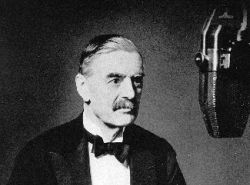 Lord Mildew of That Ilk, Chief Pongo at the British Medical Association, is worried about his eggs. Speaking at the Association’s Special Representative Meeting yesterday, the first such meeting in nearly twenty years, he implored his delegates not to put all their ‘negotiating eggs in one basket’. To Dr No, the pleas of The Lord of the Ilks sounded more in line with a foolish game-keeper laying out all his eggs individually, the better that the foxes might easily pick them off later, one by one, than a fighting chief calling his clan to arms.
Lord Mildew of That Ilk, Chief Pongo at the British Medical Association, is worried about his eggs. Speaking at the Association’s Special Representative Meeting yesterday, the first such meeting in nearly twenty years, he implored his delegates not to put all their ‘negotiating eggs in one basket’. To Dr No, the pleas of The Lord of the Ilks sounded more in line with a foolish game-keeper laying out all his eggs individually, the better that the foxes might easily pick them off later, one by one, than a fighting chief calling his clan to arms.
The reason for the exceptional SRM was that the BMA wanted to vote on a number of motions to do with the government’s proposed changes to the NHS. As is BMA way, the agenda was pre-loaded with motions deploring the decline in the standard of NHS biscuits, but in amongst the chaff there was no mistaking the wheat. The BMA mill was spinning for none other than the government’s chief architect of, and ambassador for, its ruinous Health and Social Care Bill, Secretary of State Andrew ‘Ribbentrop’ Lansley. The crux of the meeting, to be decided at the final vote, was whether to oppose this architect of doom by gentle jaw-jaw, or by the husk shattering steam hammer of war.
A full array arguments was aired. The hot-heads wanted to nuke the Secretary of State, by passing a vote of no confidence in him and calling for his resignation. Brummie petrol-heads hotted things up further, declaring that they ‘would not buy a used car’ off a minister who had said one thing in opposition, and done the reverse in government. Moderates on the floor were heard to mutter that Members of the Molotov tendency had clearly taken the wrong exit off the motorway on their way down to London.
Members of the Chamberlain tendency, led by Lord Mildew, argued for a less inflammatory approach. Omelettes today, Mildew argued, precluded hard-boiled eggs tomorrow. As an argument, it went as far as it went, but it failed to mention that tomorrow’s eggs can just as easily be scrambled, even fried, depending on who is chief in the kitchen. Other moderates warned darkly of mass defections by members, even BMA disintegration, were the meeting to vote for the nuclear option. Veteran windbagger Dr John Chrisholm opined that a vote of no confidence was pointless: ‘In decades of medical practice I have never seen a motion of no confidence be effective.’ Neither, for that matter, has Dr No, but then he is not in the habit of using votes of no confidence in his medical practice.
At the end of the day, the moderates held sway. The penultimate call to reject the bill ‘in its entirety’ was defeated by 54%. The ultimate vote, of no confidence in the Minister was, on a recount, also rejected, by 54%. The BMA, when called to the brink, bottled out of war-war, and tied its hands to jaw-jaw.
Dr No considers this a grave mistake. Short of a most unlikely Lib-Dem revolt sufficient to wreck the Bill and/or the Coalition, the only group large and weighty enough to halt the Tories and their heinous plans for the NHS are the doctors. Sure, the nurses and others can fight, and should fight, but had the doctors stood their ground, and rejected the Bill ‘in its entirety’, it would have placed the Bill, and its Tory architects, in mortal jeopardy.
Instead, we have had a triumph of appeasement over action, of Chamberlain – if that: even ‘concessions’ so far achieved, and already eroded, are not, according to Lord Mildew, ‘peace in our time’ – over Churchill.
But then, we have no medical Churchills. Had we just one, we might have heard a very different call at yesterday’s meeting:
‘I expect that the Battle for the NHS is about to begin. Upon this battle depends the survival of civilized medicine. Upon it depends our health service, and the long continuity of our institutions and our profession. The whole fury and might of the enemy must very soon be turned on us. Lansley knows that he will have to break us in the profession or lose the war. If we can stand up to him, all may be free and the life of all may move forward into broad, sunlit uplands. But if we fail, then our medical world, including our patients, including all that we have known and cared for, will sink into the abyss of a new Dark Age made more sinister, and perhaps more protracted, by the lights of perverted government. Let us therefore brace ourselves to our duties, and so bear ourselves that, if the health service lasts for a thousand years, men will still say: this was their finest hour.’
But it was not to be; and as things stand, we are about to sink into that abyss. We shall get the Bill ‘in its entirety’, with only the most token and trivial amendments. And in the years ahead, when the NHS is gone, those who follow in our footsteps will surely – and shamefully – say: this was their darkest hour.
